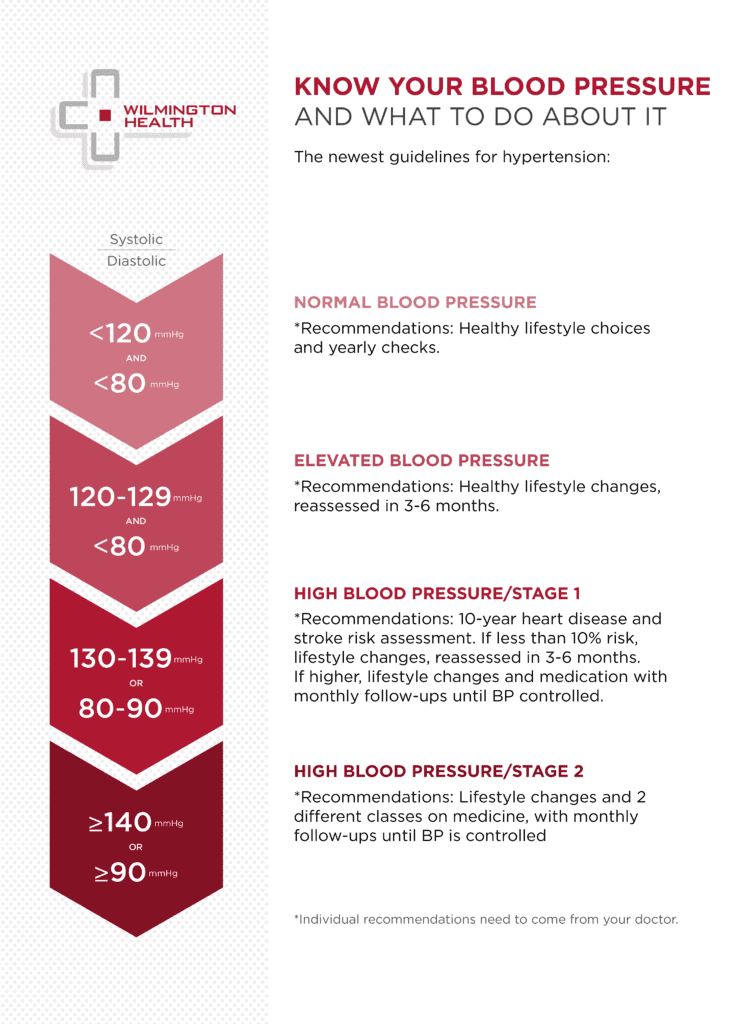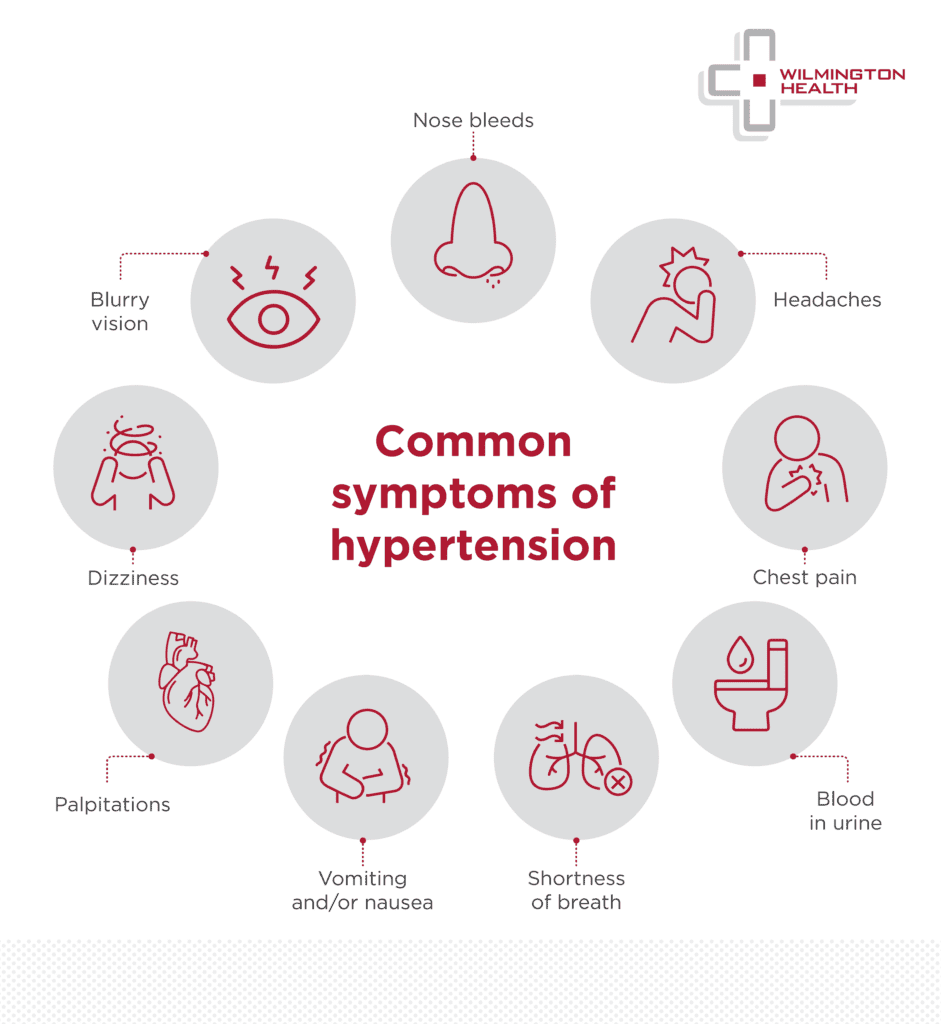
Hypertension is also known as high blood pressure. Called the “silent killer,” it often develops from unhealthy life choices. Diabetes, a sedentary lifestyle, and obesity can raise the risk.
High blood pressure can also occur during pregnancy.
With knowledge and commitment, patients can best manage hypertension risks with lifestyle changes. For most people, controlling blood pressure can reduce the risk of severe health issues.
You can inherit many cardiovascular diseases, such as hypertension. But many risk factors are controllable or even preventable. High blood pressure happens to be one of them.
What is hypertension?
Blood pressure fluctuates daily depending on activity. If measures remain elevated, that can lead to a hypertension diagnosis, which can lead to risks for other health problems. These include, but aren’t limited to, the following:
- Aneurysm
- Changes in memory or cognition
- Dementia
- Heart attack
- Heart disease
- Metabolic syndrome
- Stroke
Primary vs. secondary hypertension
- PRIMARY: It’s also called essential hypertension. Most times, it doesn’t have an identifiable cause. Plaque buildup in the arteries, or atherosclerosis, increases the risk.
- SECONDARY: Underlying conditions cause it. It can raise blood pressure higher than primary hypertension, and contributing factors include:
- Adrenal gland tumors
- Congenital heart defects
- Illegal drugs, such as cocaine and amphetamines
- Kidney disease
- Obstructive sleep apnea
- Thyroid problems
Some patients see a rise in blood pressure when they have a checkup. This is white-coat hypertension.

How do I read my blood pressure numbers?
Systolic refers to the first number in your blood pressure reading. It measures the pressure in your arteries when your heart beats.
Diastolic refers to the second number. It measures the pressure in your arteries when your heart rests between beats.

Signs and symptoms of hypertension
Most signs are so subtle they pass unnoticed, and many people don’t know they have it until a physician measures their blood pressure. Symptoms that surface include the following:
- Buzzing in the ears
- Early morning headaches
- Irregular heart rhythms
- Nosebleeds
- Vision changes
Symptoms often don’t surface until hypertension is at life-threatening levels. High blood pressure can cause:
- Anxiety
- Chest pain
- Confusion
- Fatigue
- Muscle tremors
- Nausea
- Vomiting
Hypertension, inside the numbers
- 1.28 MILLION: Adults 30 to 79 worldwide with hypertension
- 46%: Adults unaware they have hypertension
- 42%: Adults diagnosed and treated with hypertension
- 21%: Adults with high blood pressure who have it under control
The importance of getting screened
Taking blood pressure readings is fast and easy. You can measure it with automated devices on your own, but it’s critical for a health professional to check your risk and associated conditions, too. You should have it checked at least every two years, starting at age 18.
Depending on your physicians’ observations, some people need checks more often than others. Those 40 and older, or at high-risk aged 18 to 39, should have their blood pressure measured regularly. You can check blood pressure in pharmacies and other stores with public machines.
There are a few symptoms of hypertension. Screening is a vital way to determine whether you have it. Left unchecked, it can put you at risk of these health concerns.
- HEART ATTACK AND HEART DISEASE. Hypertension can make the arteries less elastic. This lowers blood and oxygen flow to your heart, causing heart disease. It can also cause the following:
- Chest pain: Also known as angina.
- Heart attack: A blockage of the blood supply to your heart. The heart begins to die without oxygen. The longer a blockage compromises blood flow, the greater impairment to the heart.
- Heart failure. Your heart can’t pump enough blood and oxygen to other organs.
- Irregular heartbeat. This can be fatal.
- CHRONIC KIDNEY DISEASE: Adults with diabetes, hypertension, or both are more likely to develop this condition.
- STROKE AND BRAIN ISSUES. High blood pressure can cause a blockage of blood and oxygen to the brain. This causes a stroke and can be fatal. Hypertension in midlife can lead to diminished cognitive function and dementia later.
Risk factors for hypertension
- Age. For men, it’s more common before age 64. For women, it’s more likely to surface after age 65.
- Race. It’s more common among Black people, and at a younger age than it appears in white people.
- Obesity or being overweight. Extra weight puts pressure on the blood vessels and kidneys. This can increase blood pressure.
- Lack of exercise. This can contribute to weight gain and the risks associated with it. Inactive people tend to have higher heart rates.
- Tobacco use or vaping. The increase happens immediately and is short-term. But prolonged damage to blood vessel walls hastens the hardening of arteries.
- Excessive salt consumption. Sodium can cause the body to retain fluid, which raises blood pressure.
- Low potassium. Potassium helps regulate salt in the body’s cells. Dehydration can also lead to low potassium.
- Excessive alcohol use. This has a link to higher blood pressure, especially for men.
- Stress. It can cause a spike in blood pressure. Related habits, such as stress eating, and tobacco or alcohol use, can also boost blood pressure.
- Chronic conditions. Kidney disease, diabetes, and sleep apnea are among those that can lead to high blood pressure.
Ways to reduce high blood pressure and improve heart health
Lifestyle changes are the most effective way to lower blood pressure to a healthy range. Getting at least 150 minutes of physical activity weekly is paramount. That equates to about 30 minutes a day, five days a week.
Also:
- Check blood pressure regularly
- Don’t smoke
- Eat healthy foods, such as fruits and vegetables
- Keep a healthy weight
- Limit the consumption of:
- Alcohol
- Foods with saturated fats (such as biscuits, butter, and cakes)
- Sodium (salt)
- Foods with trans fats (such as commercial baked goods, shortening, and fried food)
- Manage stress and other medical conditions
- Treat hypertension as doctors order
Medication can also help. If you have a hypertension diagnosis, it’s critical to do all you can to reduce your blood pressure. It’s the right way to avoid the health hazards associated with it.
Get TRUE Care for hypertension at Wilmington Health
Wilmington Health can design a treatment plan based on your blood pressure levels. Talk with your health care team about measuring your blood pressure at home. Visit our cardiology department today.
